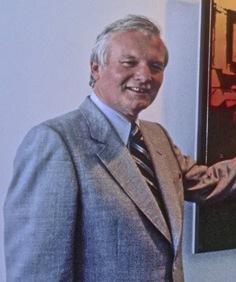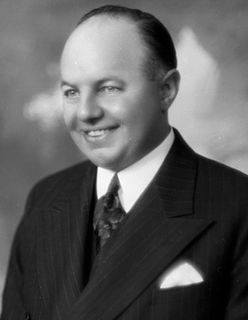This article needs additional citations for verification .(April 2018) (Learn how and when to remove this template message) |
| |||||||||||||||||||||||||||||||||||||||||||||||||||||||||||||||||
90 seats in the 22nd Legislative Assembly of Ontario 46 seats were needed for a majority | |||||||||||||||||||||||||||||||||||||||||||||||||||||||||||||||||
| |||||||||||||||||||||||||||||||||||||||||||||||||||||||||||||||||
| |||||||||||||||||||||||||||||||||||||||||||||||||||||||||||||||||
The Ontario general election of 1945 was held on June 4, 1945, to elect the 90 members of the 22nd Legislative Assembly of Ontario (Members of Provincial Parliament, or "MPPs") of the Province of Ontario, Canada.
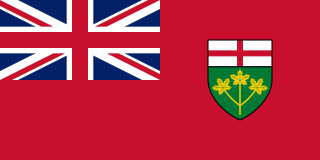
Ontario is one of the 13 provinces and territories of Canada and is located in east-central Canada. It is Canada's most populous province accounting for 38.3 percent of the country's population, and is the second-largest province in total area. Ontario is fourth-largest jurisdiction in total area when the territories of the Northwest Territories and Nunavut are included. It is home to the nation's capital city, Ottawa, and the nation's most populous city, Toronto, which is also Ontario's provincial capital.
Contents
The Ontario Progressive Conservative Party, led by George Drew, won a second consecutive term in office, winning a solid majority of seats in the legislature—66, up from 38 in the previous election.

George Alexander Drew, was a Canadian conservative politician who founded a Progressive Conservative dynasty in Ontario that lasted 42 years. He served as the 14th Premier of Ontario from 1943 to 1948.
The Ontario Liberal Party, led by former premier Mitchell Hepburn, was returned to the role of official opposition with 11 seats, plus 3 Liberal-Labour seats that it won, out of 6 contested, in coalition with the Labor-Progressive Party (which was, in fact, the Communist Party), in an effort to marginalize the CCF. The three new Liberal-Labour MPPs were James Newman of Rainy River, Joseph Meinzinger of Waterloo North and Alexander Parent of Essex North.
The Ontario Liberal Party is a provincial political party in the province of Ontario, Canada. The party is ideologically aligned with the Liberal Party of Canada but the two parties are organizationally independent and have separate, though overlapping, memberships.

Mitchell Frederick Hepburn was the 11th Premier of Ontario, Canada, from 1934 to 1942. He was the youngest Premier in Ontario history, appointed at age 37. His personality was complex, as The Globe and Mail noted in its obituary for him:
The Labor-Progressive Party was a legal political organization in Canada between 1943 and 1959.
The social democratic Co-operative Commonwealth Federation (CCF), led by Ted Jolliffe, was reduced from 34 seats to only 8.
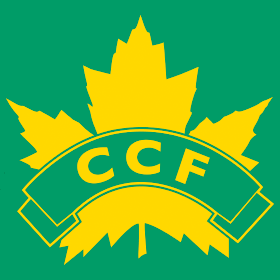
The Co-operative Commonwealth Federation – The Farmer-Labor Party of Ontario, or more commonly known as the Ontario CCF, was a democratic socialist provincial political party in Ontario that existed from 1932 to 1961. It was the provincial wing of the federal Co-operative Commonwealth Federation (CCF). The party had no leader in the beginning, and was governed by a provincial council and executive. The party's first Member of the Legislative Assembly (MLA) was elected by voters in the 1934 Ontario general election. In the 1937 general election, no CCF members were elected to the Ontario Legislature. In 1942, the party elected Toronto lawyer Ted Jolliffe as its first leader. He led the party to within a few seats of forming the government in the 1943 general election; instead, it formed the Official Opposition. In that election, the first two women were elected to the Ontario Legislature as CCFers: Agnes Macphail and Rae Luckock. The 1945 election was a setback, as the party lost most of its seats in the Legislature, including Jolliffe's seat. The party again became the Official Opposition after the 1948 general election, and defeated the Conservative premier George Drew in his seat, when Bill Temple unexpectedly won in the High Park constituency. The middle and late 1940s were the peak years for the Ontario CCF. After that time, its electoral performances were dismal, as it was reduced to a rump of two seats in the 1951 election, three seats in the 1955 election, and five seats in the 1959 election. Jolliffe stepped down as leader in 1953, and was replaced by Donald C. MacDonald.
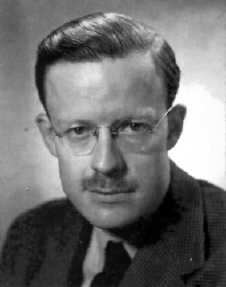
Edward Bigelow "Ted" Jolliffe was a Canadian social democratic politician and lawyer from Ontario. He was the first leader of the Ontario section of the Co-operative Commonwealth Federation (CCF) and leader of the Official Opposition in the Ontario Legislature during the 1940s and 1950s. He was a Rhodes Scholar in the mid-1930s, and came back to Canada to help the CCF, after his studies were complete and being called to the bar in England and Ontario. After politics, he practised labour law in Toronto and would eventually become a labour adjudicator. In retirement, he moved to British Columbia, where he died in 1998.
Two seats were won by the Labor-Progressive Party on its own with the re-election of A.A. MacLeod and J.B. Salsberg. The LPP contested a total of 31 ridings under the leadership of Leslie Morris who was defeated in the Toronto riding of Bracondale. As well, the Labor-Progressive Party ran several joint candidates with the Liberals under the Liberal-Labour banner.
Leslie Tom Morris was a Welsh-Canadian politician, journalist and longtime member of the Communist Party of Canada and, its front group, the Labor-Progressive Party. He was leader of the Ontario Labor-Progressive Party in the 1940s and general secretary of the Communist Party of Canada from 1962 until his death in 1964.
The Drew government called the election in an attempt to get a majority government. By exploiting increasing Cold War tensions, the PC Party was able to defeat Jolliffe's CCF by stoking fears about communism. Jolliffe replied by giving a radio speech (written by Lister Sinclair) that accused Drew of running a political gestapo in Ontario, alleging that a secret department of the Ontario Provincial Police was acting as a political police spying on the opposition and the media. This accusation led to a backlash, and loss of support for the CCF, including the loss of Jolliffe's own seat of York South. This probably helped Drew win his majority, although in the 1970s, archival evidence was discovered proving the charge. [1]
A majority government refers to one or multiple governing parties that hold an absolute majority of seats in legislature. This is as opposed to a minority government, where the largest party in a legislature only has a plurality of seats.
Lister Sheddon Sinclair, OC was a Canadian broadcaster, playwright and polymath.

The Geheime Staatspolizei, abbreviated Gestapo, was the official secret police of Nazi Germany and German-occupied Europe.





